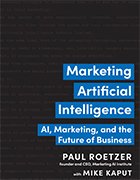How AI in marketing can empower creativity
'Marketing Artificial Intelligence' co-author Paul Roetzer explains why and how AI can change marketing and gives insight into how marketing professionals can prepare.
AI is everywhere and continues to improve and gain popularity. News media outlets are flooded with stories about the latest AI advancements, along with possible concerns regarding the technology.
Generative AI can assist with creating text, images, code and video. However, AI also has the potential to influence marketing and make tasks easier through automation. Marketing jobs might not be fully replaced by AI, but they will evolve because of it.
In the following Q&A, Marketing Artificial Intelligence co-author Paul Roetzer discusses how AI can affect marketing. He gives an overview of questions addressed in his book, including why AI matters to marketers, its limitations and what skills are needed to stay relevant in the age of AI.
Editor's note: This Q&A has been edited for length and clarity.
Even though it seems that AI just started to become popular, it has been around for a long time. Can you give some everyday examples of AI that people might not realize?
Paul Roetzer: In consumer life, AI has been there for over a decade. For example, Netflix learns your preferences to recommend shows and movies. Spotify predicts songs to listen to next. Amazon predicts what you're going to purchase. Social media feeds are all predicting what you're going to interact with and what content is most interesting to you. Many consumer applications predict behaviors, which is a form of AI.
AI content tools such as ChatGPT and Jasper.ai are generative tools, and the underlying capabilities have been emerging for years. It's really this year that AI seems to be everywhere now, including in our consumer and professional lives. Everyone now has access to this technology.
Why does AI matter to marketers?
Roetzer: Because it's going to change everything. Marketers are knowledge workers -- we think and create for a living. There are four main factors to consider for marketers to see if AI can assist. Marketers need to ask if the task is data-driven, predictive, repetitive or generative.
For example, if you are trying to send an email, you need to decide what list to send it to, what subject line and when to send it. This is a data-driven decision.
This is a predictive decision when determining past performance to drive action. You are trying to predict when someone will open this email and take action.
The repetitive part is using the same process every time, such as sending the email. The generative part is creating the image, language, video, audio or code.
When you think about those four factors, marketers do one or more of those categories each day. There is an opportunity to use AI to assist with a task. I normally say at least 80% of what marketers do every day can be intelligently automated. In the next few years, AI will assist in many tasks and will make them faster.
What are some of the limitations you see in AI today?
Roetzer: As impressive as the technology is, it's very early in its development. For example, think about generative AI and AI writing tools. They make mistakes all the time. They just make up information or they hallucinate about names, dates, places and citations.
Generative AI tools may have high error rates. They're still powerful, but the error limitations can be a barricade right now.
Depending on the industry you're in, you may not even be allowed to use some of these tools, such as financial services, healthcare or law firms. These industries tend to be more conservative about using these tools because of their inherent risks. The technology is there and adds value, but there are still obstacles, such as accuracy, that can slow down your progress and ability.
How do you think marketing jobs will evolve using AI?
Roetzer: There will be a significant increase in productivity, so more work will be done in the same amount or less time. There are some career paths that'll be very heavily AI-assisted to the point where some specific roles may evolve.
I'm not a big believer that jobs are going away, but I do think there will be a redistribution of time and resources because AI is able to do a lot of the work humans previously did. I think it's going to enhance our creative and strategic abilities.
For example, I use it for ideation and summarizing items such as scientific papers on AI. These papers are dense, so finding the main points helps me choose which one I should read instead of reading them all. I look at AI as a timesaver.
Do you think it's going to replace marketers now or in the future?
Roetzer: I would like to say no, but it will to some degree. There's going to be a race between re-imagining career paths and finding new jobs and roles that AI enables. New positions will emerge in the next year or two that are unknown as of now.
There will also be more startup companies because it will be easier and cheaper to start. These companies will need fewer employees with AI.
I hope that each organization will make choices on how to use this and educate leaders on how to think of ways to use AI to enhance workloads and not necessarily replace people. For example, a company that has a wish list of projects and campaigns to run, but can't find the time or head count to do it, can now reallocate and get more done with AI.
What skills should marketers learn to stay relevant?
Roetzer: I still think marketers need to be creative and have critical thinking and writing skills. Most outputs from generative AI need to have someone in the loop to edit or rewrite the piece. It's best not to rely on AI for all writing due to accuracy and lack of insight.
AI writing tools are great for summarizing, outlining ideation or transcribing, but I think there is still a need for great editors and writers to determine if AI's output is correct or follows the company's brand.
AI is not creative or imaginative like humans. Marketing still needs some imagination and guidance, and the AI prompts matter so it knows what to do. There is an art and science to prompting AI.
Learn more about the pros and cons of AI-generated content.
How do you think marketers should get started with AI?
 Paul Roetzer
Paul Roetzer
Roetzer: First, you have to understand the topic. You can take a course, read a book or listen to a podcast.
Then, competency comes from experimentation, which means if you're a writer, play with three or four of the writing tools, and give it the same prompts and see what happens. It's best to experiment for yourself to see how they work and how you can fit them into your workflow.
Learn more about AI at these conferences.









